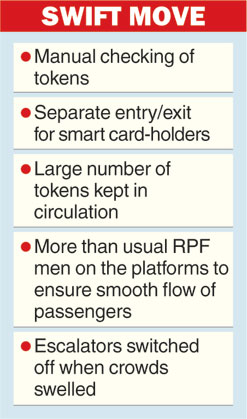
Jan. 11: A political scientist who once escaped being turned into a Naxalite hitman today recounted how his career drew him to specialise in terrorism and research on social media to forecast the spread of violent ideologies and civil strife.
Dipak Gupta, professor emeritus at San Diego State University in the US, was a student at Visva-Bharati in the late 1960s when someone showed him a bag with a gun inside and told him he had been chosen to "eliminate a class enemy". He declined, of course, and moved to the US for a PhD, where he annoyed economists and political scientists for trying to bridge their disciplines.
But, encouraged by a few economists, he persisted and developed what he describes as a data-driven model to integrate political violence into economic growth analysis, an early step towards his research much later on forecasting violence and strife by analysing billions of snippets of online chatter.
Gupta said while speaking at Presidency University's bicentennial conference that Facebook, Twitter and similar platforms could be used for reliable assessments of the public's response to India's demonetisation exercise, for instance. "I left India at a time of incredible political turmoil - Naxalism was rampant, there was economic decline in Bengal, businesses were leaving the state, unemployment was growing," he recounted, adding that the conditions made him want to work on economic models that factored in the political environment. He found himself among those challenging a core assumption of prevalent economic thinking that people are perpetually driven by self-interest.
"Are people not inspired by others, by higher callings? People make absolute sacrifices - sometimes they come as suicide bombers, sometimes they come as Mother Teresa," Gupta said. "Such behaviour cannot be explained through the assumption that people only think about themselves."
Pursuing such ideas, Gupta over the years acquired expertise in ethnic conflict, collective public action, analysis of public policies and collaborated with economists in Australia, Norway and the World Bank to model how terrorist groups at times transform into crime syndicates.
Five years ago, he joined a research initiative that brought together computer scientists, linguists, statisticians and subject experts such as himself from academic institutions across the US to develop forecasting tools based on social media chatter. The $13 million project, funded by the US Intelligence Advanced Research Projects Activity and led by Naren Ramakrishnan, a computer scientist at Virginia Tech, used mathematical models and software programs to harvest data from social media platforms and integrate information from multiple sources to generate "alerts" about future events.
The project focused on Latin American countries and used keyword-based searches across the cacophony on social media platforms to identify trends in public opinion and specific messages for forecasts about protest demonstrations, mass mobilisation campaigns, riots or strikes. "The forecasts predict the who, where, when and why of a protest," Gupta said.
The technology has limitations, he pointed out. It cannot be used to predict small-group terrorist or lone-wolf attacks. Nor can it analyse encrypted secret communications.
Faculty at Presidency University who have been following Gupta's work say they are keen to find ways to collaborate with him. "The research he has done promises to be useful in the Indian context and against the backdrop of social media expansion in India as well as the prevalent social conflicts," said Zaad Mahmood, assistant professor of political science.
Mahmood is hoping to host Gupta at Coffee House for a "quintessential Bengali adda".










